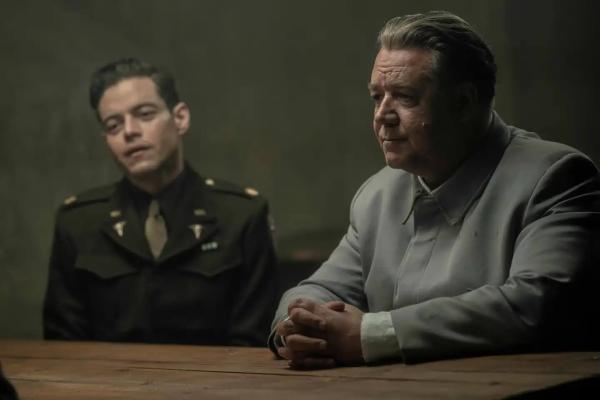Hermann Göring, Adolf Hitler’s second-in-command, was known as “the best dinner party guest you’ll ever have.” That’s according to James Vanderbilt, the co-writer and director of Nuremberg, the new film dramatizing the origin story of the Nuremberg trials, when, for the first time in history, international law held individuals—not just nations—accountable for crimes against humanity. Göring, played by a precise, brilliant Russell Crowe, was the high command of the Nazi Luftwaffe. He was also, as Vanderbilt told me during a Zoom interview, “funny, charming, and magnetic—none of the things you would associate with a Nazi.”
The film, which premiered at the Toronto International Film Festival in September and arrives in theaters Nov. 7, opens with Göring surrendering himself to the Allied troops in 1945. He directs his driver to wave a white flag...ish (the lace material that he rips from the bottom of his wife’s slip). And just like that, we learn that one of the most powerful Nazi leaders is resourceful, is brazen, is husband.
From there, Nuremberg zooms out from Göring’s swagger to the moral and legal machinery designed to dismantle it. Vanderbilt’s film isn’t a World War II film in the traditional sense. It’s a film that asks, “When does the war actually end?”
If war can ever end, the film posits, it’s not until the guilty parties are held accountable.
The world, according to Nuremberg, is less interested in accountability and more interested in the immediate execution of Nazi leaders. But “if we just shoot these men, we make them martyrs,” argues Justice Robert Jackson (a steady, convincing Michael Shannon), who spearheads the trial. “I’m gonna put Hermann Göring on the stand, and I’m gonna make him tell the world what he did so that it will never happen again,” he says.
This is the main concern of the film: Making sure what the Germans did to the Jews (and other oppressed groups like the Romani and people with disabilities) never happens again. While Justice Jackson is hell-bent on ending genocide through prosecution, psychiatrist Douglas Kelley aims to end it via social science.
Kelley, a mischievous, incisive Rami Malek, is summoned by the U.S. to essentially prevent the German prisoners from dying by suicide. Hitler and Heinrich Himmler had already used cyanide to end their own lives; the U.S. wants to prevent the other Nazi leaders from pursuing the same fate (to be clear, they want the men to die, but not until the prosecution by the U.S., the U.K., the Soviet Union, and France proves their guilt on a global stage). But, of course, Kelley becomes more than just the leader of the suicide watch. As the person with the most regular, intimate access to the surviving Nazi leaders, Kelley becomes something unsettlingly close to their confidant. While Jackson is busy studying legal precedent and developing the case against Göring and the other captured leaders, Kelley is teaching Göring magic tricks and visiting Göring’s wife and daughter.
If Jackson is hell-bent on prosecuting evil, Kelley is determined to dissect it. But when Kelley opens the soul of Göring, he hates the relatability of what he finds: a narcissist who loves his family.
If we see ourselves in a villain’s story arc, can we stop structural villainy?
“Seeing the humanity of these people and seeing them as three-dimensional characters and not just the good guy and bad guy, and the white hat and the black hat, I think first of all that’s truthful,” Vanderbilt said. “Second of all, it’s a little scarier ... He loves his wife just like I love my wife. He loves his kids just like I love my kids and yet was capable of such horrific things.”
World War II films of the past have largely focused on Allied troops, Jews, and Nazi resisters (A Hidden Life, Jojo Rabbit, Inglourious Basterds, The Pianist, Schindler’s List, The Sound of Music). Nuremberg stands out for its focus on exploring the Nazi psyche. It has that in common with 2023’s masterful Zone of Interest, which follows the quotidian life of an SS commandant and his family who live outside the walls of Auschwitz. But in Zone of Interest, we never actually see the violence of the extermination camps—we only hear it.
READ: How to Ignore the Screams of Your Neighbors
Nuremberg makes the opposite choice. During the trial, Jackson projects footage from various concentration camps; it’s the most graphic, devastating archival footage I’ve ever seen: people reduced to skin and bones, a pile of dead bodies so large that the corpses had to be moved with bulldozers. It seems Vanderbilt wants us to look closely at both the horror and the love that Nazis were capable of.
When does the war end?, the film asks. Maybe it doesn’t. Maybe it just changes uniforms and tactics. Vanderbilt leaves us with the uncomfortable sense that the trial was not the conclusion of history’s darkest chapter, but the prologue to an age still trying to convince itself that law can save us from ourselves.
If the law can’t save us, perhaps we can rescue ourselves with the power of story. That, at least, is the movie’s implication—it’s effective and, I fear, a bit naive. This is by no means a Nazi-sympathizing film, but it is a Nazi-humanizing film. If we see ourselves in a villain’s story arc, can we stop structural villainy? At this point, I’ll try anything.
Got something to say about what you're reading? We value your feedback!






